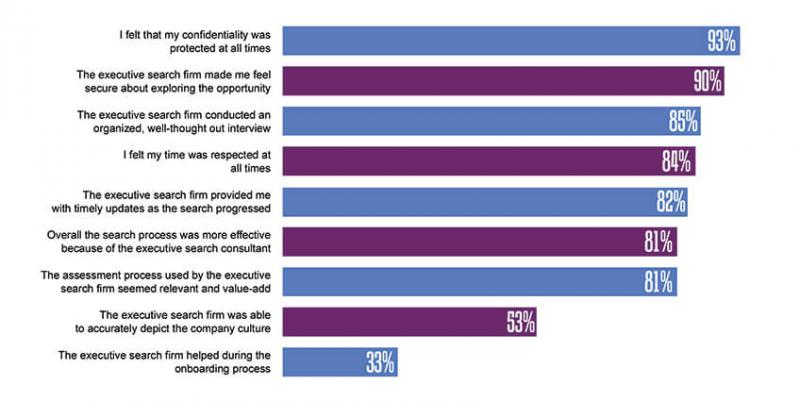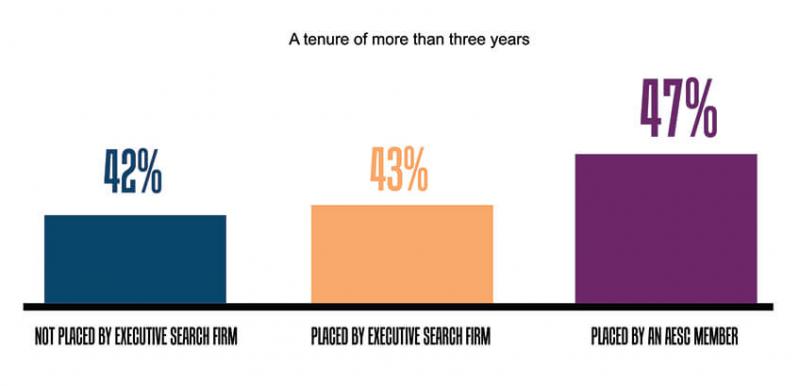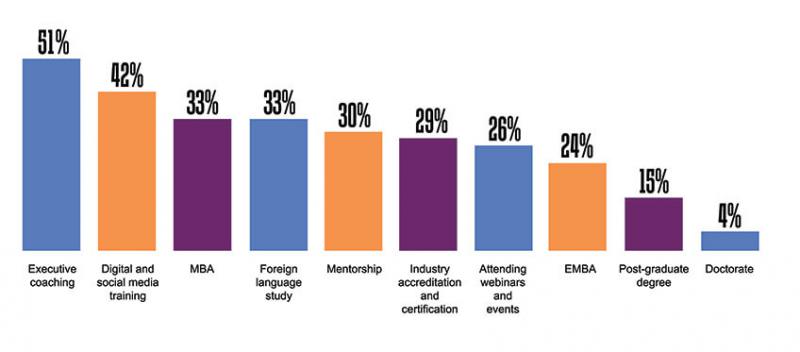
Executive Talent Magazine
In addition to looking at the challenges facing both executive search and leadership consulting firms and their clients, we surveyed 2,500 executive-level candidates to understand their experience with executive search advisors and learn about opportunities for improvement.
The individual risk associated with making a career move is significant and extends beyond an executive’s own career management goals. There are personal and professional reasons for wanting reassurance that the executive search firm the candidate is working with can be trusted. Three traits that clients need in order to trust an executive search firm are professionalism, confidentiality and objectivity. So how does that compare to executive-level candidates?
From the perspective of a candidate the key thing is the regular follow up.
We asked candidates who had been successfully placed by an executive search firm for the elements of the search process that they felt were successful and those that could be improved. The areas that are most valued when the process works best are quite similar to the areas identified for improvement. No doubt about it – candidates value open, honest communication and trust. They also seek straight forward feedback and more help in the onboarding process.
This gives us an idea of the areas that are most important to candidates during an executive search. In addition to having a trusting relationship with the executive search firm, candidates expect firms to have an understanding of their clients’ culture and needs, and to be open and communicative throughout the process.
The best executive search firms know that building strong trusting relationships with candidates is critical to the search process – especially during the assessment and negotiation stages. The executive search consultant needs to develop a trusting relationship with both the client and the candidates in order to ensure a positive outcome, especially at the critical final stage of negotiation. This trusting relationship helps ensure that the candidate who the client wants to hire ultimately says “yes.” The trusting relationship is important both for the successful candidate and the others. Why? Those who aren’t successful will remember how they were treated. The executive search consultant is an extension of the client – a partner – and the way they treat candidates sends a powerful message about the executive search firm and the client. Of course today’s unsuccessful candidate could be tomorrow’s successful candidate and even tomorrow’s client. Treating people with respect throughout the process just makes good business sense.
Candidates had mixed views about the use of assessments. Increasingly executive search consultants are using a range of assessment methodologies – psychometric testing, cultural assessment, structured interviews, and predictive analytics, to name a few – to get more specific about a candidates’ professional and personal suitability for the role. Yet over half of the comments we received from candidates indicated dissatisfaction. This can range from distrust of methodologies to intimidation about the results. Some even feel “they have reached a point in their career where this isn’t needed.”
There is clearly an opportunity to present assessment as a win-win process. Candidates don’t want to accept a position where they won’t succeed and the more senior they are, the more this is true. The risk of accepting a new leadership position is every bit as great for the candidate as for the client (if not more so). A strong approach to assessment helps to ensure that the candidate will thrive. We suspect candidates are uncomfortable with what can be a “black box” approach to assessment and see sharing honest feedback as a best practice.
From the perspective of a candidate the key thing is the regular follow up. I have had a few experiences where you have plenty of contact, you’ve had a relationship with a search consultant, you have feedback, then it goes quiet because the client hasn’t clarified needs. -Guy Healy, Former CEO (Switzerland), Lloyds Bank
Most successful*
-
The understanding of cultural fit
-
The consultant's knowledge of their client's needs
-
Trusting relationship
-
Open and regular communication
*Based on open text reponses.
Areas for Improvement*
-
Better understanding of client's culture
-
Better and more regular communication
-
More support with onboarding
-
Honest feedback
*Based on open text reponses.
What is a Positive Candidate Experience?
To get a more complete picture of what defines a positive candidate experience, we posed a series of statements to our respondents and asked them to answer ‘true’ or ‘false’ (Chart 4.1). Nine out of ten candidates felt that their confidentiality was protected at all times (93%) and that the executive search firm made them feel secure about exploring the opportunity (90%). Executive search firms scored over 80% positive for another five statements, including providing a well-thought out interview, being respectful of candidates’ time, and providing timely updates as the search progressed.
Chart 4.1
When asked if they had been placed in their current position by an AESC member and provided with a complete list to cross reference, those candidates who had been placed by an AESC member revealed more positive outcomes in seven of the nine instances – demonstrating that AESC members represent the highest standards in the profession, and have a clear commitment to quality, professionalism and creating trusting relationships with clients and candidates.
The ability to understand the clients’ culture was the second lowest ranked statement, with just over half of them (53%) agreeing with the statement that ‘the executive search firm was accurately able to depict the company culture.’ Accurately depicting organizational culture is clearly an area that candidates feel could be improved.
A good service I had recently was based around onboarding. The executive search firm helped me identify the part of the team where the incoming executive may encounter problems or potential conflicts because of the new role.
A good service I had recently was based around onboarding. The executive search firm helped me identify the part of the team where the incoming executive may encounter problems or potential conflicts because of the new role. – Jose Renato Domingues, Chief People and Sustainability Officer, Grupo Tigre.
The lowest ranked statement was help during the onboarding process, with only one-third (33%) of candidates saying that the executive search firm assisted during the onboarding process. Candidates seek more help from the executive search advisor in terms of helping to develop plans for their first few months in the new position, helping to identify key milestones and political and strategic issues to navigate. However, the number of clients who were interested in onboarding support was almost non-existent. In speaking with selected AESC members to further understand this issue, we heard that clients often feel they “have this covered” and don’t need additional help. Clearly there is a gap between what is provided and what is needed. Considering that the top two metrics for success of an executive search assignment are long-term business results and tenure, there seems to be an obvious need to enhance the onboarding process in partnership to deliver strong long-term business results.
In terms of tenure, we asked our candidate respondents how long they were in their current position and how they got to that position, knowing that tenure is an important metric from the client’s perspective (Chart 4.2). Tenure certainly isn’t the only indicator of quality, but it is a simple indicator of success.
Chart 4.2
The results – those with the highest tenure were placed by AESC members, an indication that AESC members get better results.
Ensuring Executive Skills Are Relevant
In addition to having meaningful and trusting relationships with executive search firms, it is also important for executive-level candidates to actively manage their own careers (Chart 4.3). In AESC’s recent BlueSteps Job Outlook Report, we asked candidates what the most important educational opportunities are for staying relevant in the executive job market.
Chart 4.3
Today when I personally look for a candidate I invite my consultant to first discuss with me the environment, challenges and the problems at hand. Then I typically ask the search firm to focus on personality.
Executive coaching was the highest ranked response, demonstrating the value of this specific leadership advisory service to top executives. And we know this is important to clients — 75% of our client respondents said that they would either definitely work with an executive search firm or consider working with an executive search firm in the future for executive coaching.
The second highest-ranked factor that executives felt would keep them relevant in the job market was digital and social media training, ranking above MBAs, industry accreditation, attending events, and many other factors. We know that it is becoming increasingly important for executives to be “digital savvy”, although in terms of client ranking, significant digital expertise fell below other broader leadership skills. To learn more about the study and participant demographics, download the full issue.


